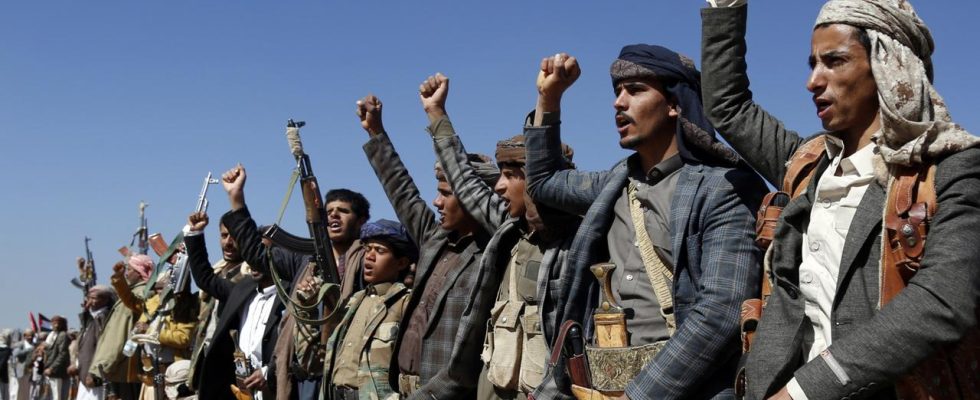Militarily, the Houthi army in Yemen is likely to be inferior to a Western military mission. But the Houthis have gained in reputation in the region – and behind them is Iran, which is pursuing its own goals.
Children and young people in uniform drill on the deck of the hijacked freighter Galaxy Leader, which is anchored off the coast of Yemen. Images of Houthi propaganda online show trips for young people that the militia organizes to the hijacked ship and how children spread militant slogans. “We tell our brothers in Palestine, you are not alone,” said this teenager, “we are by your side until the last drop of blood.”
For weeks, the Houthis in Yemen have been trying to distinguish themselves as fighters for the Palestinian cause by shelling cargo ships in the Red Sea and even hijacking one. The Houthis are demanding aid for the people of the Gaza Strip and an end to the fighting in the Gaza Strip. Only then will the rocket fire be stopped, they say.
The Houthis are celebrating their success and are now organizing trips to the hijacked Galaxy Leader.
Is there now a real threat of escalation?
After numerous shipping companies announced that they would avoid the Red Sea, the USA founded a naval mission together with other countries in December to protect international freighters. At first it was just about intercepting missiles in the Red Sea. But in mid-January, the USA and its allies decided to counterattack. Houthi positions in Yemen were bombed.
Some observers fear that there is now a real risk of escalation. Although the Houthis only have 200,000 men with rockets, the US-led coalition could easily cope with that, Frank Ledwidge from Portsmouth University recently told DW TV. “But the Houthis are not stupid and they are extremely well connected. Just think what will happen if even a single US soldier is killed – then the US would be drawn into the next Middle East war in an election year.” That’s the last thing they wanted, Lewidge analyzes, but it could happen quickly.
This is one reason why many EU states, including Germany, are cautious. When it comes to participation in the US naval mission, the EU is now doing its own thing. Most actors want to avoid a direct war against the Houthis at all costs. Even if the militia is militarily inferior, it still has a powerful ally – Iran.
What Iran wants to demonstrate
The Houthis are part of the so-called Iranian axis of resistance against Israel, along with Hezbollah in Lebanon, Hamas in the Gaza Strip and Shiite militias in Iraq. There are attacks against Israel and US bases from all sides. Iran has armed the Houthis militarily. Is he also behind the attacks in the Red Sea?
The Houthis have neither the ability nor the decision-making power to carry out such an undertaking alone, said Yemeni political observer Faras al Beel on Al-Hadath television. “It’s very clear that the Houthis are just implementing an Iranian project that doesn’t even really have anything to do with the Palestinian cause. Iran’s goal is to show that it controls the region around Israel.”
Iran officially denies any involvement in the Houthis’ actions. And the Houthis also pursue their own interests. They want to make a name for themselves and be popular, both within Yemen and in the region. And they seem to be succeeding.
Hardly any criticism from the region
Egyptian military expert Samir Ragheb observes that criticism from the region is largely absent. “Egypt, although it is massively affected by the escalation in the Red Sea, has not condemned the actions of the Houthis, but has condemned the American air strikes, as has Saudi Arabia. It does not criticize the Houthis, even though they are actually enemies, because everyone who Anyone who criticizes the Houthis is immediately seen as a supporter of Israel.”
In order not to appear as traitors to the Palestinian cause, the other Arab states have so far let the Houthis have their way. And this despite the fact that Egypt, for example, is feeling the consequences of the warlike sideshow. 40 percent fewer ships than before are heading to the Suez Canal – revenue that Egypt urgently needs.
“Every day I’m worried anew,” says the head of the Suez Canal Authority, Ussama Rabie, on On TV. “We were supposed to have 70 ships going through the Suez Canal per day, but now we’re at 40. We’re in close contact with the shipping companies and asking if there’s anything we can do for them. We just hope things get back to normal quickly. “
It is impossible to predict whether and when the situation in the Red Sea will ease. Until then, many ships will continue to take the much longer detour via South Africa and the Cape of Good Hope.
Anna Osius, ARD Cairo, tagesschau, January 21, 2024 6:42 a.m

